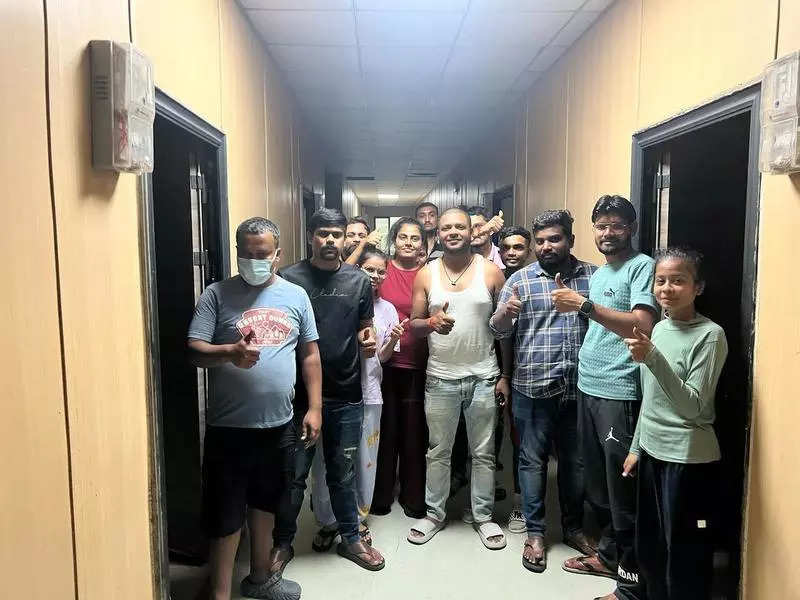70 Indians rescued from Myanmar’s cybercrime hub | Hyderabad News

Hyderabad: About 70 Indians trapped in the cybercrime hub of KK Park in Myawaddy have been rescued by Myanmar’s armed forces and moved to Mae Sot, a border town in Thailand. Indian authorities in Thailand are monitoring the situation and coordinating their return.
According to sources about 15 of the rescued individuals are from Gujarat, 20 from Rajasthan, five from Andhra Pradesh, two from Telangana, and others from Punjab, Uttar Pradesh, Bihar, Haryana, and Karnataka. Five of the victims are women, mainly from Gujarat and Maharashtra.
KK Park, a major centre for online scams, was raided by Myanmar’s Border Guard Forces (BGF), who freed the individuals who had been coerced into cybercriminal activities.
Speaking to TOI from Mae Sot, K Madhukar Reddy from Karimnagar in Telangana, said that around 70 to 80 Indians were waiting at a bus station for further processing.
“We are requesting Indian authorities in Bangkok to shift us to India as early as possible,” said Reddy, who had managed to contact his family in Telangana before his access to mobile communication was cut off.
Kakuluru Santosh from Hyderabad, Manikanta and Bodapati Ashok from Vizag, and MV Patel from Gujarat were also with him.
The latest crackdown follows reports of foreign nationals, including Indians, being forced into fraudulent operations. BGF, which faced backlash internationally for allegedly being hand in glove with Chinese-run scam centres, was involved in the raid and has vowed to target other scam centres. Authorities suspect Chinese crime syndicates have been operating these facilities for years. Some suspected organisers have been detained.
Sources in the ministry of external affairs said Myanmar’s militia has indicated conducting further raids to target more such scam centres in the region.
The current case follows a series of instances in which Indians were lured to Cambodia, Laos, and Myanmar under false job promises, only to be forced into cybercrime. Victims recounted instances of physical assault and coercion by Chinese handlers, forcing them to engage in online fraud and phishing scams. Reports suggest many Indians are also willingly living in such camps.
Meanwhile, similar crackdowns are ongoing in Cambodia, where several Indians have been freed from cybercrime rings.
According to sources about 15 of the rescued individuals are from Gujarat, 20 from Rajasthan, five from Andhra Pradesh, two from Telangana, and others from Punjab, Uttar Pradesh, Bihar, Haryana, and Karnataka. Five of the victims are women, mainly from Gujarat and Maharashtra.
KK Park, a major centre for online scams, was raided by Myanmar’s Border Guard Forces (BGF), who freed the individuals who had been coerced into cybercriminal activities.
Speaking to TOI from Mae Sot, K Madhukar Reddy from Karimnagar in Telangana, said that around 70 to 80 Indians were waiting at a bus station for further processing.
“We are requesting Indian authorities in Bangkok to shift us to India as early as possible,” said Reddy, who had managed to contact his family in Telangana before his access to mobile communication was cut off.
Kakuluru Santosh from Hyderabad, Manikanta and Bodapati Ashok from Vizag, and MV Patel from Gujarat were also with him.
The latest crackdown follows reports of foreign nationals, including Indians, being forced into fraudulent operations. BGF, which faced backlash internationally for allegedly being hand in glove with Chinese-run scam centres, was involved in the raid and has vowed to target other scam centres. Authorities suspect Chinese crime syndicates have been operating these facilities for years. Some suspected organisers have been detained.
Sources in the ministry of external affairs said Myanmar’s militia has indicated conducting further raids to target more such scam centres in the region.
The current case follows a series of instances in which Indians were lured to Cambodia, Laos, and Myanmar under false job promises, only to be forced into cybercrime. Victims recounted instances of physical assault and coercion by Chinese handlers, forcing them to engage in online fraud and phishing scams. Reports suggest many Indians are also willingly living in such camps.
Meanwhile, similar crackdowns are ongoing in Cambodia, where several Indians have been freed from cybercrime rings.
















